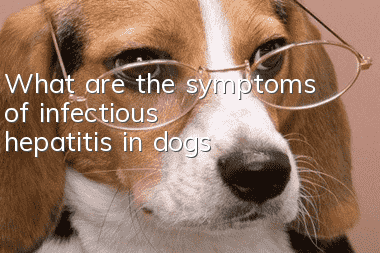What are the symptoms of infectious hepatitis in dogs?

Clinical symptoms of canine infectious hepatitis:
1. Canine infectious hepatitis is divided into three types: acute, subacute and chronic.
2. Acute: The affected dog is afraid of cold, has low body temperature, is physically depressed, has no appetite, especially wants to drink water, has abdominal pain and shrinks into a ball, vomits, has diarrhea, vomits blood-like gastric juice and excretions like jam. Bloody stools.
3. Subacute: Symptoms include corneal edema, blepharospasm, blindness and serous eye secretions.
4. Chronic: mild fever, varying appetite, constipation and diarrhea, and poor mental state.
Precautions for the treatment of canine infectious hepatitis:
1. Canine infectious hepatitis is caused by the canine infectious hepatitis virus through the digestive tract and is an epidemic disease. It has the characteristics of wide spread, rapid spread and high incidence rate. Therefore, when sick dogs are found, they should be isolated in time to prevent the spread of the epidemic source.
2. Strengthen the feeding and management of sick dogs, and carry out sanitation and disinfection of the surrounding environment.
3. Develop an immunization program, prepare vaccinations, and improve the body's immunity. At present, the two-combination vaccine for canine distemper (detailed introduction) and the five-combination vaccine for canine distemper are widely used. The first vaccination is given at 2 to 3 months of age, and again after 20 days.
4. Early detection, early diagnosis and early treatment of sick dogs can reduce death or corneal damage and increase the cure rate. The dog should be given mental comfort and encouraged to take medicine to improve its confidence in restoring light after corneal damage.
- Tonsillitis in dogs
- My hand is often bitten by a silver fox, how can I train it not to bite?
- How to treat a dog with pneumonia?
- What should you pay attention to when feeding a Samoyed dog? What should you pay attention to when feeding a Samoyed dog?
- What causes dog farts to smell so bad?
- Name your pet with naming ideas.
- How to treat gastric ulcer in dogs
- Dog keeps farting and it smells bad
- Can dogs eat noodles? Are noodles suitable for dogs to eat?
- Can dogs eat rice?



